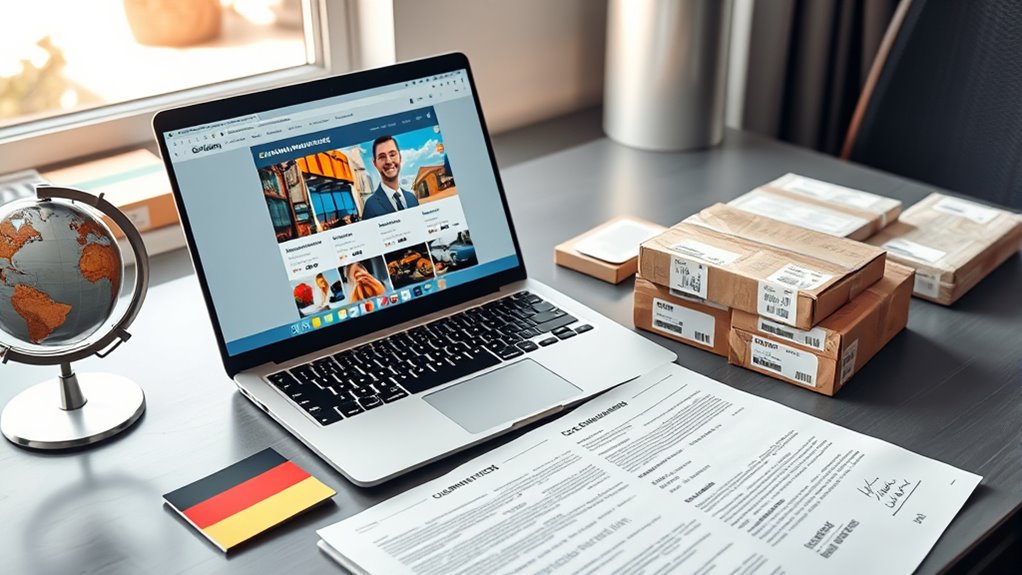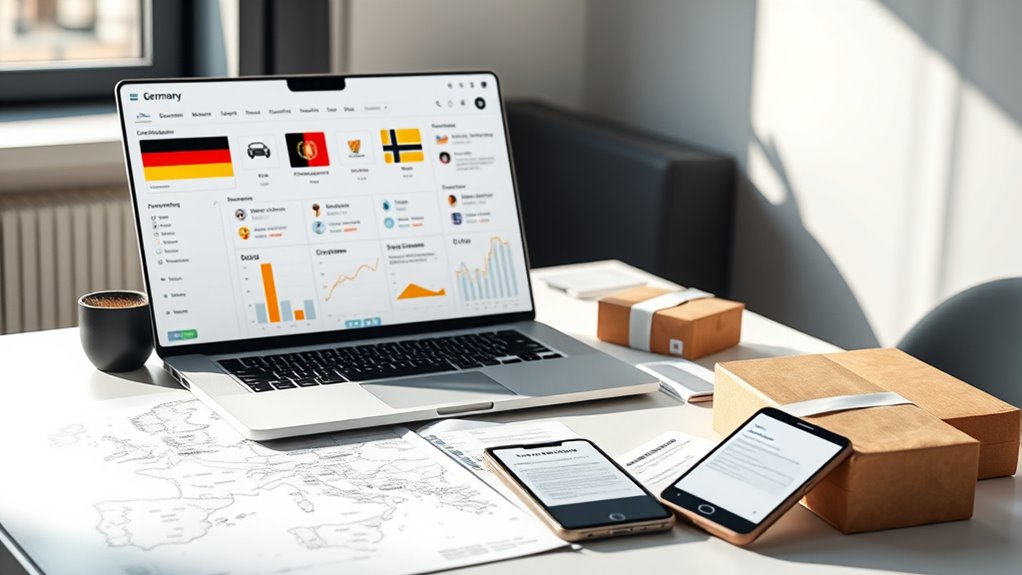When dropshipping to German consumers, you need to guarantee you follow strict customs regulations, including accurate documentation and paying duties and taxes on time. Compliance with import laws and product safety standards, like CE markings, is vital to avoiding delays or penalties. Providing clear product info, transparent shipping policies, and excellent customer service helps meet consumer expectations and legal requirements. Staying informed about policies and logistics ensures smooth operations—continue to learn more about making your dropshipping business succeed in Germany.
Key Takeaways
- Ensure accurate customs documentation, including proper product classification and payment of duties and taxes for smooth clearance.
- Comply with German import regulations and safety standards, including CE markings and necessary certifications.
- Clearly communicate shipping policies, product details, and return procedures to meet consumer protection laws.
- Partner with logistics providers familiar with German customs to prevent delays and ensure reliable delivery.
- Provide prompt, transparent customer support to handle complaints and build trust with German consumers.

If you’re considering dropshipping to German consumers, understanding the local market is essential for success. Germany has strict customs regulations that you need to navigate carefully to avoid delays or penalties. When shipping products into Germany, you must comply with customs requirements, which involve accurate documentation, correct classification of goods, and paying applicable duties and taxes. Failure to adhere to these regulations can result in shipments being held up at the border, increasing costs and frustrating your customers. It’s indispensable to research and stay updated on customs policies, especially for products that might be restricted or require special permits. Working with reliable logistics partners who understand German customs procedures can help streamline this process, ensuring your packages move smoothly through customs clearance. Additionally, understanding import regulations and how they impact your shipments can help you prevent costly errors and delays.
Consumer protection is a priority in Germany, and as a dropshipper, you need to prioritize your customers’ rights and safety. German consumers are well-informed and expect high standards of quality and transparency. You’ll be required to provide clear product descriptions, accurate pricing, and detailed shipping information. Additionally, consumer protection laws mean you must respect rights related to refunds, returns, and warranties. If a customer receives a defective or incorrect item, German laws typically favor the buyer, making it imperative for you to have a straightforward return policy in place. Providing prompt, transparent communication about shipping times, product details, and after-sales support helps build trust and reduces disputes.
Furthermore, you should familiarize yourself with regulations regarding product safety, especially for items like electronics, cosmetics, or children’s products. Non-compliance can lead to legal action, fines, or your products being banned from the German market. Ensuring your suppliers meet European safety standards is essential, as products must often carry CE markings or other certifications to demonstrate compliance. This not only protects your customers but also shields your business from legal liabilities.
In addition, understanding consumer protection laws means you should prepare to handle complaints efficiently and fairly. German consumers appreciate quick resolutions; delays or dismissive responses can damage your reputation and lead to negative reviews or legal complaints. Offering clear policies and excellent customer service demonstrates your commitment to consumer rights and helps you establish a trustworthy brand.
Frequently Asked Questions
What Is the Minimum Order Size for Dropshipping in Germany?
In Germany, there’s no fixed minimum order size for dropshipping, but your supply chain management should focus on supplier vetting to guarantee reliability. Many suppliers prefer larger orders to justify logistics costs, so you might need to place a minimum order that covers their thresholds. Always check with your supplier directly, as minimums can vary, and aim to establish a clear agreement that aligns with your business needs.
How Do Customs Duties Affect Dropshipping Profit Margins?
Customs duties can cut into your profit margins like a knife through butter. When you ship to Germany, customs valuation and import tariffs play a big role in costs. If tariffs are high, you’ll pay more, squeezing your profits. To stay afloat, keep an eye on these charges, factor them into your pricing, and consider negotiating customs terms. Staying informed helps you avoid surprises that could sink your profits.
Are There Specific Product Restrictions for German Consumers?
Yes, there are specific product restrictions for German consumers. You need to be aware of product bans and restricted items, such as certain toys, cosmetics, and electronics, which require special certifications or are outright banned. Always check German regulations before listing products to avoid legal issues. Failing to comply can lead to fines, shipment delays, or your products being seized. Stay informed to guarantee smooth dropshipping operations.
How Does Consumer Privacy Law Impact Data Collection?
Like a vault safeguarding treasures, German privacy laws tightly control data collection. You must prioritize data security and obtain clear consent from consumers before gathering any personal info. Effective consent management isn’t optional; it’s your shield against legal trouble. By respecting these laws, you build trust and ensure compliance, making your business a trusted name in Germany. Neglecting this can lead to hefty fines and damaged reputation.
What Are the Best Practices for Handling Returns and Refunds?
You should create clear return policies and refund procedures that comply with German laws. Make sure your return process is simple, providing detailed instructions and timelines. Communicate your policies upfront on your website, so customers know what to expect. Promptly process refunds once returns are received, ensuring transparency. By maintaining fair and transparent return policies, you build trust and reduce disputes, making your dropshipping business more reputable and compliant with legal standards.
Conclusion
Guiding dropshipping to German consumers is like steering a ship through careful waters—you need to understand legal and logistical currents. By staying compliant with regulations and ensuring efficient logistics, you’ll build trust like a sturdy bridge. Remember, success depends on attention to detail and proactive planning. Stay informed, adapt quickly, and you’ll find that serving German customers becomes as smooth as sailing on calm seas. Keep these considerations in mind, and your dropshipping venture will thrive.









